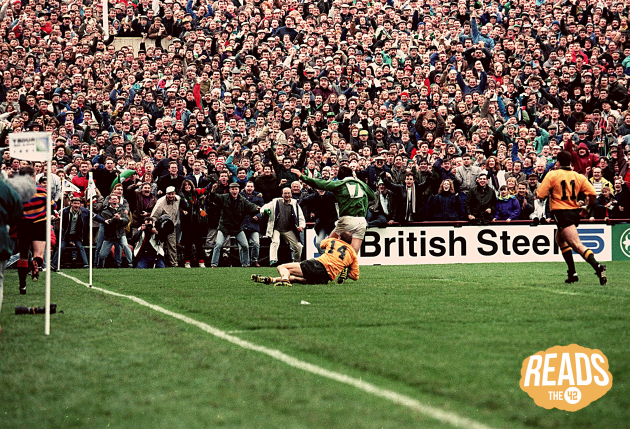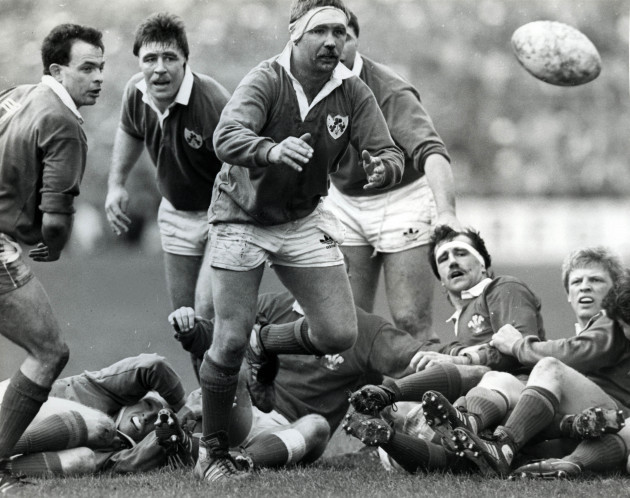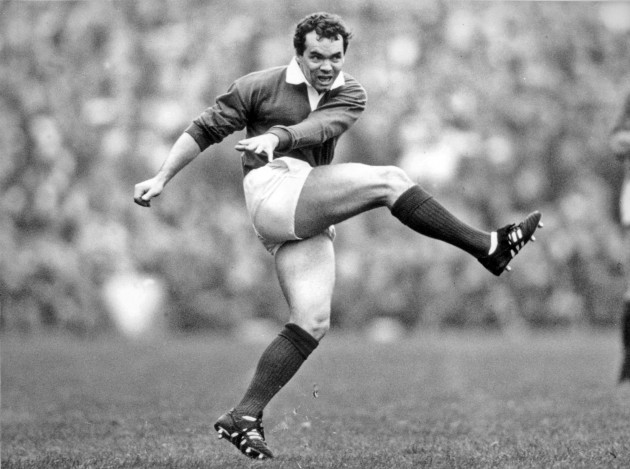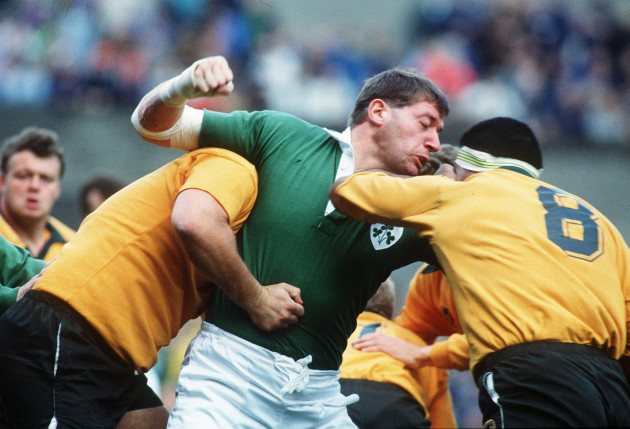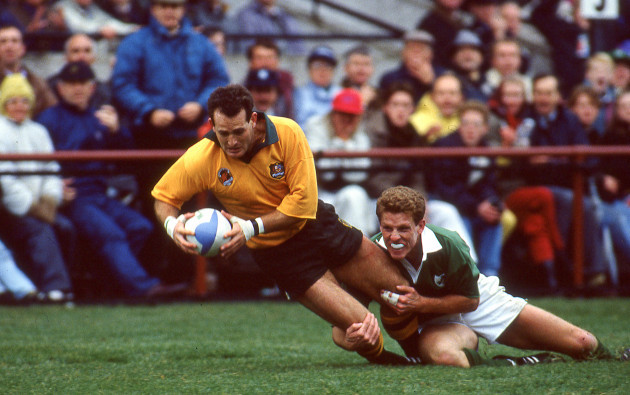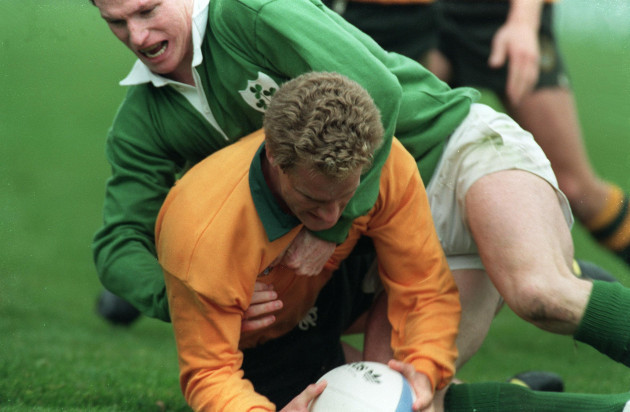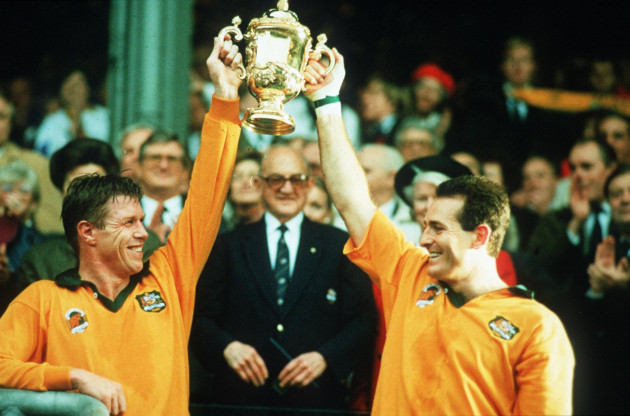PART ONE: THE STRIKE
IT WASN’T THAT he couldn’t see any light at the end of the tunnel. As Des Fitzgerald went to bed on the eve of the World Cup opening ceremony in 1991, ‘even the bleedin’ tunnel’ wasn’t visible.
At that stage of his life, he was an old man in rugby terms but young in everyone else’s world. All three of his children were toddlers and a fourth would arrive a week before Ireland’s opening game of the tournament. Meanwhile work in this new sector, a futuristic department called IT, was going nicely although the demands were increasing.
That summer he went away with Ireland on a mini-tour to Namibia and was forced to take a work computer with him, the equivalent of a bachelor heading off on his stag night with the mother-in-law and her sisters. There was no such thing as a Wifi code back then. Even getting a phone line out of Africa was a struggle.
To make matters worse, he suffered food poisoning as Ireland also showed a lack of stomach for a scrap with a rugby minnow, losing both Tests. That was how it was. In all, Fitzgerald played 35 times for Ireland but tasted victory in just eight, Canada, Romania and Zimbabwe among the scalps.
- For more great storytelling and analysis from our award-winning journalists, join the club at The42 Membership today. Click here to find out more >
If results were bad, conditions were worse. They heard all the whispers about Wallaby and All Black players getting envelopes stacked with cash whenever they’d appear for a club team in Italy or Japan. “There was a movement towards professionalism and the IRFU were trying to do a finger in the dyke job,” Fitzgerald says now, 30 years on. “Whether they were right or wrong doesn’t really matter because there was a wind for change.
“TV money was coming into the sport and the popularity of the game was reflected in the crowds going through the turnstiles. Players wanted to get better. To get better meant giving the sport more time. To give it more time, well, that meant giving up your job.
“Unfortunately, the IRFU were caught in a timewarp where they were trying to hold back professionalism. They just couldn’t.”
Years later, Fitzgerald would deliver one of the most memorable quotes of all time, comparing the IRFU of that era to Erich Honecker, East Germany’s President until the fall of communism and the Berlin Wall. “But in our world,” Fitzgerald says, “the wall never came down.”
By 1991, though, it was beginning to crumble.
RALPH KEYES DIDN’T even know there was a wall. After winning his first cap in 1986, he had to wait five years for his second. “I was always in and around the squad, like I sat on the bench about 20 times, but in those days there weren’t tactical subs. A half-back would only have come off if he was dead.”
So he waited …….and waited ……and waited. Paul Dean retired but a former Wallaby, who actually played against Ireland in the 1987 World Cup, jumped the queue. Brian Smith was being groomed for the ’91 World Cup which was a bit of a problem, firstly because he was mediocre and, secondly because, by 1991, he on his way back to Australia to play rugby league. That meant Keyes was getting a promotion. “I was buzzing heading across to London for the opening ceremony,” the Cork-man says.
The fizz soon went out as soon as he had a chat with Fitzgerald. A strike was on the cards, Keyes was told. “For about an hour,” Keyes said, “I was in the horrors. A strike? I wasn’t part of the inner sanctum. I wasn’t fully aware what was going on.”
Few were, really just Fitzgerald, Philip Mathews and Brendan Mullin.
“The specific issue,” says Fitzgerald, “centred on a photograph we had taken with an insurance company who had done a sponsorship deal with us. It was only for small money but the money was to be paid to us through the IRFU. They (the union) had agreed to this so when the money didn’t arrive, the players issued an ultimatum.”
In short, that meant no pay, no play.
“This discussion was going on all through the tournament,” Fitzgerald says, “but by the week of the Australia game (the World Cup quarter-final), we were prepared to sit in the dressing room and not come out of it.”
Was it a game of bluff? No one will ever know but the issue was serious enough for Fitzgerald, Mullin and Mathews to spend the Wednesday evening prior to their World Cup quarter-final arguing the case with Union officials. The debate went on ‘until the wee hours’, according to Fitzgerald.
“Thankfully it was sorted and the nuclear button didn’t get pressed,” says Keyes. “I’m not sure the nation would have looked upon us players too kindly.”
Common sense prevailed. The Union waved the white flag, conceding defeat to the Ireland players, who in turn, gave the go-ahead to play. By 1.01pm on Sunday 20 October 1991, they were engaged in a different kind of fight.
PART TWO: DOWN BUT NOT OUT
AUSTRALIA ARRIVED IN Lansdowne Road with a record of seven wins and one defeat from their previous eight matches. Ireland arrived in Lansdowne Road on the back of a bus that had got stuck in traffic for half-an-hour. “The bus driver tried to be clever and get us to the ground via this rat run,” says Keyes. “Nice idea, pity about the cars parked illegally in that laneway. We didn’t move an inch for ages.”
Having contemplated walking to the ground at one stage, they eventually got lucky. The road was cleared in time for the bus to park up, a mere 40 minutes before kick-off. Whatever about staying in the dressing room, this squad, at one point, feared they mightn’t even get into it.
Imagine the pent-up frustration, then. The traffic jam, the image rights debate, the previous week’s defeat to Scotland; the fact they had been written off. Anyone in the crowd that day could sense things might boil over. Within a minute, they had.
Foreshadowing what was to come in the same area of the pitch a decade later, Mathews clocked Aussie No8 Willy Ofahengaue with a right hook. And whatever about the influence Roy Keane’s tone-setting tackle on Marc Overmars had on the 2001 soccer World Cup qualifier between Ireland and Holland, the brief violent opening to this game had a clear effect.
“I had a good view of it, to be fair,” says Keyes. A good six inches smaller than most of the Wallaby pack, the Ireland out-half wisely opted to remain in his ringside seat rather than volunteer to climb through the ropes: “Look, I’d to do a lot of thinking for the rest of the match,” Keyes laughs, “I had to keep all my cerebral qualities intact.”
With the niceties dispensed with, Ireland were driven by a raging will and the passionate support of the home crowd. “Australia wouldn’t have ever tasted that atmosphere, even on their previous tours north,” says Keyes.
The Cork-man had the game of his life, nailing four kicks from four, as well as landing a drop goal. Mathews, too, was immense, so too Nick Popplewell, Steve Smith and Fitzgerald in the front row, as well as Donal Lenihan and Neil Francis, the locks. “There was always a chance they would overestimate themselves and underestimate us,” says Fitzgerald.
“Plus we knew there were certain things we could compete against Australia. No 1, the scrum; No 2, the line-out. That was huge in those days, because line-outs weren’t as clean as they are now.”
This is Keyes again: “Twenty minutes into the match, we quickly realised our line-out was going fantastically well, so much so that we had no problem kicking the ball off the park.
“That charged the atmosphere. The crowd could sense we had a chance. They started loud; they got louder.”
Twice they fell silent, once when David Campese cut through the Irish midfield; then when the winger sprinted clear down a wide channel. Yet even though those tries were supplemented by three kicks from Michael Lynagh, the Wallabies never put distance between themselves and Ireland on the scoreboard.
There was a good reason for that. For once, Ireland were fit. A young Eddie O’Sullivan was their strength and conditioning guy. “Plus the Namibian trip, although chaotic in terms of the food poisoning, ultimately worked out because we trained at altitude and eventually got the benefits from that,” says Fitzgerald.
Keyes didn’t get on that trip but his summer months were spent nipping out of work at Norwich Union to spend his lunch hour practising his goalkicking at Cork Con. He’d end that World Cup as the tournament’s leading points scorer.
While his hard work paid off, Fitzgerald’s assertion that Ireland’s “backline was not a match for theirs,” was painfully accurate. And yet, with eight minutes remaining, Ireland stayed in the hunt, trailing 15-12.
You know by now what happened next, the run from Gordon Hamilton that began in his own half and ended in folklore, the chase to the line that seemed to go on forever, the improbable image of Campese trailing in his wake, the failed attempt by Australia’s other, less celebrated winger, Bob Egerton, to haul him down, the pitch invasion, the noise.
With a few minutes remaining, Ireland were 18-15 up and on the way to a World Cup semi-final.
PART THREE: THE MELTDOWN
DES FITZGERALD HAS a funny line he trots out for after dinner speeches. “It does not matter whether you win or lose, what is important is how you place the blame.”
Thirty years on, poor old Rob Saunders, Ireland’s scrum-half that day, is still reminded about the aftermath of Hamilton’s try.
As Keyes was lining up his conversion, Lynagh was gathering the Australian players under the posts.
“Michael told us to relax,” Australia’s prop, Tony Daly, said. “Thankfully, none of us started searching for the panic button.”
Australian centre Tim Horan said Lynagh’s sentiments helped them to stay focused. “We knew that we weren’t going to lose,” Horan said.
Fitzgerald, though, knew what Ireland had to do to win. “The critical thing was they had to kick off, so we just had to receive the ball and then make touch,” he said. “Had we managed to do that then it was game, set and match.
“But finding touch meant kicking the ball up into the stand. Rob Saunders went for the big one. Guess what? He missed it by a yard; Campese caught it and that was it. Within seconds they had a five-yard scrum. You can’t give a team like that a five-yard scrum. They scored 19 tries in that World Cup; their backs got 17 of those.”
Lynagh took control. “Long we got left, ref?” he asked Jim Fleming, the official in charge. “Two minutes,” came the reply.
“That’s one more than we need,” said Lynagh.
He was right. A pre-rehearsed move did the damage, Lynagh scoring in the corner. “The amazing thing was the silence,” Daly said. “The crowd just went from euphoria to total misery in seconds. It was just so quiet.”
Fitzgerald was “shattered” afterwards. “It was just like you are about to sit down for dinner and someone whips your plate away,” he says.
One minute Ireland were 18-15 up and the next they were 19-18 behind. And the minute after that, the final whistle had sounded. “I thought we were gone,” Bob Dwyer, the Wallaby coach, said afterwards. “My legs were shaking.”
Sitting close to Dwyer, the Wallaby wives and girlfriends were in tears, preparing to go home. “Afterwards one of the Australians told us that the first thought that went through their mind after Gordon’s try was that they’d left their laundry into the dry cleaners and were worried they wouldn’t get it back,” says Keyes.
Ireland’s players had bigger things to be concerned about. That was an experienced team, and within a year, a third of them had gone. They’d never get that time back. “It was cup rugby, so radically different to a Five Nations match,” Mathews told me two years ago. “If things go wrong, you don’t have time to adjust. And sadly, unfortunately, but truthfully, we have rarely been able to win clutch games in the tournament. There’s something deep within us as a rugby nation. Wales did us in ‘87, Scotland found a way to beat us in 1991, when Finlay Calder just went and clocked Jim Staples. They won and got Samoa in the quarters. We lost and were paired with Australia instead.”
Sympathy was in short supply. After the game, Keyes had joined his wife in the Berkeley Court when he spotted a man wearing a cloth cap and a trench coat staring at him. “As soon as he opened his mouth, I knew he was from Limerick,” Keyes recalls. “I’ll tell you something,” the man said to Keyes, his arm outstretched, his face twisted into a sneer. “Shannon would have won that match from that position.”
The bar room analyst had a point. “If you get to the actual trough, you then have to drink out of it,” says Keyes. “We had the chance and didn’t take it. Had we won, New Zealand were next and the rumour was that their camp weren’t as unified or as good as they normally are. That was going to be in Lansdowne Road, too.”
This is Fitzgerald: “I wasn’t anticipating this would be the end of our tournament; I thought we had a chance of beating Australia and still think we would have beaten New Zealand in the semis because it was the worst All Blacks team I had ever seen in my life. Losing the way we did annoyed me then. It still does to an extent.”
PART FOUR: THE LEGACY
IN SO MANY different ways, the events of that week were a trailer for the decade to come. Australia flirted with disaster but found a way to win. They usually did back then, finishing the ‘90s with two World Cups. Ireland, meanwhile, found a way to lose, again a taster for what was to come.
Throughout that decade, Ireland would play 37 Tests against France, Scotland, South Africa, New Zealand and Australia. They drew one, lost their other 36.
Chaos reigned. Having run Australia so close in ’91, they were beaten out the gate a year later, the Aussies returning with more or less the same side, Ireland seeking new faces to replace the heroes of ’91. Fitzgerald, Keyes, Hamilton, Mathews and Lenihan were gone and so was whatever hope the side had of building momentum. “A case of unfulfilled potential,” Mathews says of that era.
Unbeknownst to everyone else in Irish rugby, one man was beginning to fulfill his potential as a mover and shaker in rugby admin, a person who wore the Australian No 21 shirt when Hamilton and Lynagh exchanged tries in that World Cup quarter-final and who, a year later, assumed a different duty as Australia’s tour treasurer.
It was a small job but a big one and everyone in the Australian camp agreed that David Nucifora – now the IRFU’s high performance director – was the right man to serve as banker for 30 players on their European tour, organising tickets for their families, acting as their social secretary, converting their daily allowance into different currencies.
“The players basically use me as their bank when on tour,” Nucifora told The Sydney Morning Herald on that 1992 tour. “It is just easier for one person to keep track of it all by depositing their funds and helping them take money out.”
This was three years before rugby officially turned professional. And yet the Herald reported that Nucifora “oversees the revenue going into the official players’ company fund, entitled the Wallabies Promotions and Marketing Pty Ltd”.
Whereas the IRFU were arguing with their players a year earlier, the Australian union were looking at their players’ rites in a different light.
“The players are not looking at any financial gold mines or a major dividend, but it does create an activity which is essential to team spirit,” John Breen, the Wallabies manager on that tour, said.
From a distance of nearly 30 years, words like ‘revenue’, ‘company fund’ and ‘dividend’ do not sound like terms you’d ordinarily associate with amateurism. Rugby was changing. Professionalism was coming and the man who has been a catalyst for change since he assumed his high-powered role with the IRFU in 2014, knew it.
Ireland weren’t ready for that change.
Nor were they ready for a place in the semis. Two minutes of composure was all they needed to get there. Keep the ball and keep their heads. Two minutes, and they would have been World Cup semi-finalists.
Two minutes!
Thirty years on, they’re still waiting.
For more great storytelling and analysis from our award-winning journalists, join the club at The42 Membership today. Click here to find out more >

